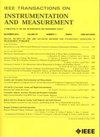Time-Varying Unknown Input Constrained UKF With Unbiased Minimum Variance Estimator for Nonlinear Dynamic Indoor Thermal Profile Estimation
IF 5.9
2区 工程技术
Q1 ENGINEERING, ELECTRICAL & ELECTRONIC
IEEE Transactions on Instrumentation and Measurement
Pub Date : 2025-09-04
DOI:10.1109/TIM.2025.3606059
引用次数: 0
Abstract
Estimating unknown inputs in indoor heating, ventilation, and air conditioning (HVac) systems, particularly under the influence of diverse environmental constraints and time-varying relative humidity, presents a significant challenge. A viable solution is to use a weighted least-squares (WLS) approach for estimating unknown inputs, which uses an unbiased minimum variance (UMV) estimator in conjunction with an unscented Kalman filter (UKF)-based nonlinear filtering technique. This allows for the simultaneous estimation of the system’s state and the unknown inputs. To accurately represent the real-life nonlinear thermal profile influenced by these uncertain inputs, it is essential to adopt an RC network-based mathematical modeling approach that captures the system’s dynamic behavior over time. The integration of the UMV-based optimal estimator with the UKF culminates in the proposed UKF with UMV for unknown inputs (UKF-UMV-UI) estimation algorithm. Extensive experimentation with the proposed UKF-UMV-UI algorithm has been conducted in a laboratory-scale realistic environment, dealing with uncertain and challenging unknown inputs. The results of the investigation indicate that the proposed method outperforms the UKF with unknown input (UKF-UI) by 41.64% and 35.85% in cumulative mean squared error (CuMSE) for two distinct measurement conditions, respectively.基于无偏最小方差估计的时变未知输入约束UKF非线性动态室内热剖面估计
估计室内供暖、通风和空调(HVac)系统的未知输入,特别是在各种环境约束和时变相对湿度的影响下,提出了一个重大挑战。一个可行的解决方案是使用加权最小二乘(WLS)方法来估计未知输入,该方法将无偏最小方差(UMV)估计器与基于无scented卡尔曼滤波(UKF)的非线性滤波技术相结合。这允许同时估计系统状态和未知输入。为了准确地表示受这些不确定输入影响的实际非线性热剖面,必须采用基于RC网络的数学建模方法来捕获系统随时间的动态行为。基于UMV的最优估计器与UKF的集成最终形成了未知输入的UKF与UMV (UKF-UMV- ui)估计算法。在实验室规模的现实环境中,对所提出的UKF-UMV-UI算法进行了广泛的实验,处理了不确定和具有挑战性的未知输入。研究结果表明,在两种不同的测量条件下,所提出的方法在累积均方误差(CuMSE)上分别优于未知输入UKF (UKF- ui)的41.64%和35.85%。
本文章由计算机程序翻译,如有差异,请以英文原文为准。
求助全文
约1分钟内获得全文
求助全文
来源期刊

IEEE Transactions on Instrumentation and Measurement
工程技术-工程:电子与电气
CiteScore
9.00
自引率
23.20%
发文量
1294
审稿时长
3.9 months
期刊介绍:
Papers are sought that address innovative solutions to the development and use of electrical and electronic instruments and equipment to measure, monitor and/or record physical phenomena for the purpose of advancing measurement science, methods, functionality and applications. The scope of these papers may encompass: (1) theory, methodology, and practice of measurement; (2) design, development and evaluation of instrumentation and measurement systems and components used in generating, acquiring, conditioning and processing signals; (3) analysis, representation, display, and preservation of the information obtained from a set of measurements; and (4) scientific and technical support to establishment and maintenance of technical standards in the field of Instrumentation and Measurement.
 求助内容:
求助内容: 应助结果提醒方式:
应助结果提醒方式:


